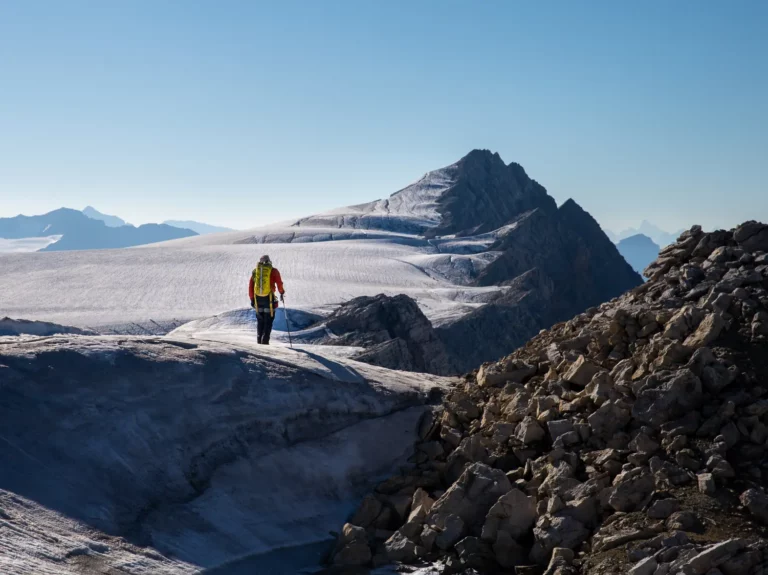Environment
Environment
ACC's Environmental Values
As Canada’s national mountain organization, The Alpine Club of Canada (ACC) promotes mountaineering while being committed to conservation of mountain environments. As ACC members we recognize that access to the mountains obligates us to understand and protect these unique environments. To this end, we, ACC members, are guided by the following environmental values and principles of action.
Our Values
Leadership: We believe that we must act as stewards of the integrity of mountain environments and seek the knowledge and understanding required to do so effectively and responsibly.
Responsibility: We believe that we are accountable for our impacts on the mountain environments we travel through.
Human Development: We believe that access to mountain environments is essential to the full development of the human spirit, and that such access should not be unduly constrained, except where it is essential for the protection of these environments.
Sustainability: We believe that future generations should have access to similar experiences and personal challenges as those we seek in the mountains, and that we have an obligation to protect their interests.
Culture: We believe that communities and cultures that live within mountain environments deserve our understanding and respect.
Our Principles of Action
We will act to ensure that our activities in the mountains are carried out in accordance with our values. We will utilize “leave no trace” practices.
We will act on our individual and collective responsibility to ensure that this standard of practice is met.
We will act as stewards of the mountains, seeking to reduce human impacts that threaten the integrity and sustainability of mountain environments.
We will act to increase our knowledge and understanding of mountain environments, and our impacts upon them, so as to inform and guide our mountain practices and stewardship efforts.
Access
We affirm the intrinsic value of mountain regions and mountain sports to the human spirit. We advocate for self-propelled, low impact public access to wilderness areas and climbing locations when such access can be maintained without undue degradation of the alpine environment.
We strongly believe that access is best achieved through respectful collaboration and open dialogue. Through our 22 sections located across the country, we work in close collaboration with government, private landowners, and other user groups to develop access management plans and agreements that ensure responsible use of climbing and backcountry areas by our members. We ask all our members to set an example by respecting access agreements and by leaving no trace.
Access Partnerships
Access Organizations
Across Canada there are regional access groups that represent the interests of self-propelled outdoor enthusiasts. A list of some of these groups with whom the ACC has collaborated can be found below:

Mountains need stewards now more than ever.
Please step up to protect our wilderness landscapes.
It has never been more important for the ACC to have the resources to lead initiatives to ensure Canadians can access alpine environments – safely, affordably and responsibly – while providing leadership in conservation, responsible use, education and scientific studies.
Read the Access and Environment case for support.

Donate to the Environment Fund
Canada’s wilderness is a diminishing and irreplaceable resource of great intrinsic value, not only to those who recreate in its spaces, but to everyone on our planet.
The Environment Fund provides financial support each year to projects related to the preservation of alpine and Arctic environments, and climbing areas in Canada. Your donation goes directly to these projects.
UN International Year of Glaciers' Preservation
UN International Year of Glaciers' Preservation
2025 marks the United Nations’ pivotal International Year of Glacier Preservation—a global initiative to raise awareness about the critical state of the world’s glaciers. The Alpine Club of Canada (ACC) stands committed to amplifying this crucial message, dedicating this digital platform to sharing comprehensive resources, compelling narratives, scientific insights, and educational materials. Through curated content including expert videos, scientific research, interactive timelines, and personal stories, we aim to illuminate the profound significance of glaciers to our planet’s ecological balance and human communities. This hub will serve as a dynamic, evolving resource for members, outdoor enthusiasts, environmental advocates, and anyone passionate about understanding and protecting these magnificent ice formations.
References and Links
- Recognizing the Value of Wilderness and Backcountry Experiences Within a Public Land Management Context
- UIAA Environmental Objectives and Guidelines
- Kathmandu Declaration
- 7 principles of Leave No Trace
- Canadian Mountain Network
- Kluane Lake Research Station
- Columbia Mountains Institute of Applied Ecology
- FAO Mountain Partnership
- Mountain Legacy Project






